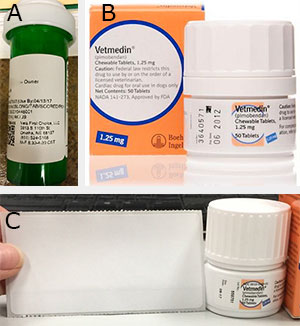

Pyper, a 7-year-old domestic longhair, visits the veterinarian frequently to manage heart and pancreas conditions and regularly takes three medications. As a result, his owner said, he appears in fine health, and happy: “Never stops purring.”
An orange-and-white cat named Pyper was boarding at Henrietta Animal Hospital in upstate New York this spring when his veterinarian, Dr. Michelle Brownstein, checked his medications and came across an unfamiliar green bottle.
It was Vetmedin, Pyper’s heart medication, taken out of its original white bottle and repackaged. Inspecting the label, Brownstein saw that the tablets were dispensed by Vets First Choice, LLC, an online pharmacy in Omaha, Nebraska.
The company, headquartered in Portland, Maine, was founded six years ago on the premise that veterinarians in private practice would welcome a way to maintain pet-medication sales in the face of internet rivals. Using the pitch “take back your pharmacy,” the company encourages practitioners to make Vets First Choice their virtual in-house store, competing in price and service with outside online pharmacies.
Brownstein had recently signed on with Vets First Choice but the puzzling thing was that Pyper’s owner opted not to buy the medication from them. He had asked for a written prescription so he could order the drug from another internet pharmacy.
How, then, had Vets First Choice come to fill the prescription?
In chasing down the answer, Brownstein discovered a little-recognized fact about the company that she thought was supposed to be her ally: Vets First Choice routinely transfers prescriptions out and in, often to and from the very pharmacies that veterinarians in private practice consider their nemeses.
Founder and CEO Ben Shaw said transfers are a part of doing business as a pharmacy. The goal, he said, “is to ensure continuity of patient care.” At the same time, Shaw noted, accepting transfers affords Vets First Choice a chance to gain customers on behalf of veterinary hospitals. “This is an opportunity to acquire a client,” he said.
Brownstein has a sharply different view. To her eyes, Vets First Choice is supporting the entities that it purports to fight.
“I am livid having just partnered with VFC [to] find that they are in bed with the internet pharmacies that are killing us,” she posted in May on a message board of the Veterinary Information Network, an online community for the profession and parent of the VIN News Service.
Brownstein was equally direct when she spoke with Shaw by telephone last week. “You guys got caught with your pants down,” she said, and “You are playing both sides of the fence.”
Shaw said it’s not that way at all. “I can absolutely assure you that we’re not supplying any other pharmacies,” he replied. “Those are competitors.”
Shaw told the VIN News Service in a separate conversation that Vets First Choice accepts roughly 50 to 100 prescription transfers per month from competing pharmacies. The reasons vary. Sometimes, for example, it’s done at a customer’s request. Other times, a pharmacy is out of stock of a particular drug.
Transfers go both ways. “I admit we have transferred prescriptions to our competitors when we’re unable to meet the needs of the prescription request,” Shaw said.
So far this year, he said, Vets First Choice has transferred prescriptions to 1-800 PetMeds, Allivet, PetCareRx, VetRxDirect, Veterinary Pharmacies of America, Foundation Care, HealthFirst, Sam’s Club, Wegmans, PetsChoicePharmacy, ValleyVet, Walmart, Drs. Foster & Smith and Costco.

A. An unfamiliar green bottle caught Dr. Michelle Brownstein’s eye and launched her research into the pharmacy practice of transferring prescriptions. The photo, by Brownstein, was altered by the VIN News Service to obscure the owner’s name.
B. Brownstein had requested the medication be dispensed in original packaging, such as is shown in this screen shot from petcarerx.com.
C. Vets First Choice accepted the prescription transfer from PetCare Rx and repackaged the drug because its labels don’t fit the original bottle, according to company CEO Ben Shaw, who provided this photograph to demonstrate the problem.
Accepting transfers from another pharmacy is not only in the interest of patient care, but obligated by law, Shaw said, “except in North Carolina if it’s an abortionary drug.”
But pharmacy experts said pharmacies are not compelled by law to accept transfers, although doing so is considered a professional courtesy and reflects regard for patient welfare.
“There’s no obligation for the pharmacy to accept it,” said Carmen Catizone, executive director of the National Association of Boards of Pharmacy (NABP), whose members regulate the profession in each state. “They can say that for whatever reason, they don’t want to accept it. What the boards of pharmacy would hope — for continuity of care and really putting the patient primary — is that the pharmacy would accept it, but there’s no requirement.”
In the case of Pyper's medication, the prescription was transferred to Vets First Choice from PetCare Rx. The reason for the transfer is unclear. In an interview, PetCare Rx founder Blake Brossman declined to discuss the specific case out of concern for patient and client confidentiality. However, he confirmed that prescription transfers happen regularly between pharmacies, usually when a pharmacy is out of a product.
“We consider all competitors friends for the purpose of pets’ health,” Brossman said.
He added, “Any pharmacy that … is competent and has Vet-VIPPs certification and is a well-run organization, we’re happy to work with anyone, including big-box retailers.”
Vet-VIPPS is an accreditation program run by the NABP for internet pharmacies. Twenty-three pharmacies have Vet-VIPPs certification.
Shaw said Vets First Choice is proud of the service it provided in accepting Pyper’s prescription and dispensing his medication, mainly because the company was able to serve a pet and customer, and also because it was able to gain new business. He said Vets First Choice notified Pyper’s owner of the transfer.
Brownstein maintains that as the prescribing doctor, she should have been notified, too. Shaw said the transaction would have shown up on her account with Vets First Choice, but Brownstein said she saw no record of it.
She also was not notified that Vets First Choice would be unable to dispense the medication in its original packaging as directed on the prescription. Brownstein said she asks that medications be provided in their original packaging as a way to guard against sketchy online pharmacies, which may try to sell counterfeit products or drugs obtained from questionable sources.
Shaw said Vets First Choice repackaged the Vetmedin because the pharmacy’s labels are too big to fit the original bottle. He said the pharmacy chooses not to place the label on the larger outer box because customers may not keep the box. “Outer packaging can be discarded, leaving the drug without a proper label, which could cause an unsafe situation,” he explained. “Pharmacy best practice, in our opinion, is to make sure the label stays with the medication container itself.”
Pharmacy expert Catizone told the VIN News Service that pharmacists are obliged to follow the prescribing doctor’s instructions unless doing so would cause harm to the patient.
If a pharmacy deviates from the doctor’s instructions in the interest of patient safety, Catizone said, regulators would be unlikely to take action against the pharmacy. However, in such cases, the pharmacy should consult with the prescriber. “At a minimum, they should be calling the doctor to explain that the label won’t fit,” he said.
Shaw allowed that Vets First Choice provided poor service to Brownstein. “Our communications stunk,” he said, apologizing.
Brownstein is considering continuing to do business with Vets First Choice but would like the company to be more transparent about its practices, especially with veterinarians newly signing on. “The only reason that I went with you guys is that there were a lot of colleagues who liked your services,” she told Shaw.
Pyper’s owner, meanwhile, had no idea of the tension that arose over the prescription for his cat’s chronic heart condition.
The owner, who asked not to be identified by name, said that after he placed the order with PetCare Rx, he received a telephone message from Vets First Choice stating that it had his pet’s medication.
“I was like, what is Vets First Choice? I had no idea what this company is,” he said. “I thought they were a branch of PetCare Rx, or it was like a mortgage or student loan, where they sell the loan. I had no idea how it worked.”
Pyper’s owner said the message didn’t mention a transfer. “I never got anything clear [such as], ‘I know you didn’t order from us, but is it OK for us to fill it?’ They left me a message saying the prescription was being sent, and they left an 800 number if I had any questions for the pharmacist, which of course, I didn’t, because he’s taken this medication for a while.”
Pyper is 7 and has issues with his heart and pancreas. Because the cat regularly takes three medications and requires multiple visits to the veterinarian each year, including for twice-yearly X-rays and ultrasounds as needed, his owner is eager to save money on prescriptions. He doesn't care which pharmacy dispenses the drugs, provided it’s reputable. “As long as it comes to the house and the price is competitive, I don’t mind [switching],” he said.
However, he never really knew what Vets First Choice was, so he didn’t go back to that pharmacy. With the next prescription for Vetmedin, as before, he mailed it to PetCare Rx. That time, PetCare Rx filled it.